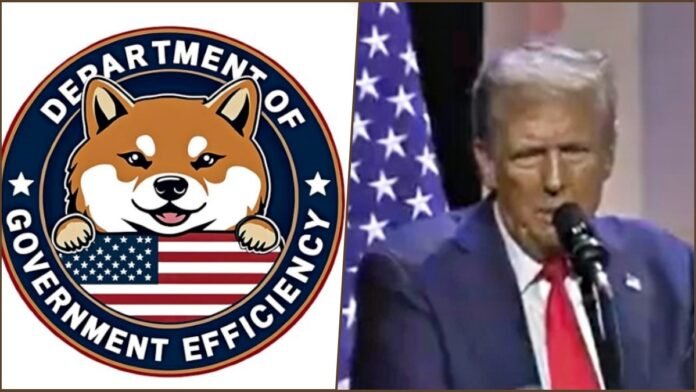
Key Points:
- The US Department of Government Efficiency (DOGE), led by Elon Musk, canceled a $21 million grant for boosting voter turnout in India, sparking a political debate.
- Donald Trump defended the move, questioning why US taxpayer money was allocated to India, a country he described as “wealthy” and “highly protectionist.”
- The controversy has drawn criticism from India’s ruling BJP, which labeled the aid as “external interference” in India’s electoral process.
- The aid cut is part of a broader DOGE initiative to eliminate what it calls “wasteful spending” on international programs.
Washington: Former US President Donald Trump has stirred controversy by questioning the allocation of $21 million in US taxpayer funds to boost voter turnout in India. Speaking at his Mar-a-Lago residence in Florida on February 18, Trump backed the decision by the Elon Musk-led Department of Government Efficiency (DOGE) to cancel the funding. He argued that India, being a wealthy nation with high tariffs on American goods, does not need financial support from the United States.
“Why are we giving $21 million to India? They already have a lot of money. They are one of the highest taxing countries in the world, especially for us. We can hardly get in there because their tariffs are so high,” Trump said during his remarks. While expressing respect for India and its Prime Minister Narendra Modi, he questioned the rationale behind funding voter turnout initiatives abroad when similar issues exist within the US.
The Controversy: What Triggered It?
The issue began when DOGE announced on February 16 that it had canceled several foreign aid programs deemed unnecessary. Among these was the $21 million grant intended for increasing voter turnout in India. The department also scrapped other international funding initiatives, including:
- $29 million for strengthening Bangladesh’s political landscape.
- $39 million for biodiversity conservation in Nepal.
- $47 million for improving learning outcomes across Asia.
DOGE, which oversees federal spending efficiency, justified these cuts as part of its mandate to eliminate wasteful expenditures. The announcement came after DOGE published a list of canceled programs on X (formerly Twitter), describing them as excessive uses of taxpayer money.
India Reacts: BJP Calls It “External Interference”
In India, the ruling Bharatiya Janata Party (BJP) criticized the now-canceled funding as unwarranted foreign interference in domestic affairs. BJP spokesperson Amit Malviya questioned the intent behind such grants, stating: “$21M for voter turnout? This definitely is external interference in India’s electoral process. Who gains from this? Not the ruling party for sure!”
Malviya further linked the initiative to alleged foreign influence campaigns supported by billionaire philanthropist George Soros. He accused previous Congress-led governments of enabling such interference through agreements like the controversial 2012 Memorandum of Understanding (MoU) between India’s Election Commission and international organizations.
Trump’s Broader Criticism: Trade Barriers and Tariffs
Trump’s remarks also reignited his long-standing criticism of India’s trade policies. During his presidency, he frequently called out India as one of the most protectionist nations globally due to its high tariffs on American goods. At a joint press conference with Prime Minister Modi on February 13, Trump reiterated these concerns while announcing plans for reciprocal tariffs to counter non-reciprocal trade arrangements.
“India has been just about the highest tariffed nation anywhere in the world when it comes to us. I don’t blame them necessarily—it’s just a different way of doing business,” Trump said during the event.
Elon Musk’s Role and DOGE’s Mission
The Department of Government Efficiency (DOGE), led by billionaire entrepreneur Elon Musk, has been tasked with streamlining federal operations and reducing unnecessary spending. Musk recently announced plans to shut down USAID the agency responsible for global humanitarian efforts citing inefficiency and lack of transparency in its operations.
According to reports, USAID’s global programs were halted earlier this month, and its website was taken offline before Musk’s announcement. A temporary restraining order issued by a Trump-appointed judge has prevented DOGE from placing 2,200 USAID employees on administrative leave.
Political Fallout and Global Implications
The cancellation of foreign aid programs has sparked debates both domestically and internationally:
- In the US: Critics argue that cutting international aid undermines America’s global influence and soft power. Others support Trump’s stance, viewing it as prioritizing domestic needs over foreign expenditures.
- In India: Opposition leaders have demanded clarity on how such funds were allocated under previous administrations. Former Chief Election Commissioner S.Y. Quraishi clarified that USAID provided technical assistance but denied receiving direct funding.
- Globally: Countries like Bangladesh and Nepal have also raised concerns over losing critical development funds amidst growing geopolitical tensions.
As debates continue over the role of foreign aid in diplomacy and governance, Trump’s remarks highlight broader questions about accountability and priorities in international funding. For now, DOGE’s decision signals a shift toward greater scrutiny of taxpayer-funded programs abroad a move that may redefine America’s approach to global engagement under Musk’s leadership.
Whether this decision will strain US-India relations remains uncertain, but it underscores growing tensions over trade policies and perceived imbalances in bilateral partnerships.

















































